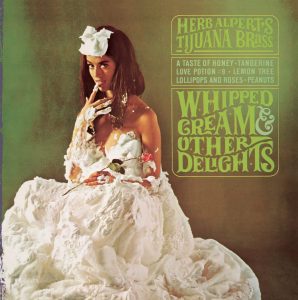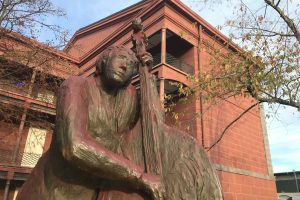Trumpet star Herb Alpert and his wife, singer Lani Hall, return to New Orleans for a December 14 performance at the Jefferson Performing Arts Center in Metairie. The couple’s A Christmas Wish tour features Alpert’s many hits with The Tijuana Brass and solo hits.
This year and next year hold multiple milestones for the multifaceted Alpert. The recording star, co-founder of A&M Records, painter, sculptor, Broadway producer and philanthropist, released his 50th album in September. This year is also the 51st anniversary of Alpert’s marriage to Hall, whom he met in 1966 when she was a member of the A&M act Sérgio Mendes and Brasil ’66.
Alpert’s other milestones include his 90th birthday on March 31, 2025, and, on April 1, the 60th anniversary of the classic Tijuana Brass album Whipped Cream & Other Delights. He’ll celebrate those landmarks next year with a 10-city tour featuring a new edition of The Tijuana Brass culminating in a 90th birthday concert at Lincoln Center in New York.
Alpert’s nephew and producer, Randy “Badazz” Alpert—co-writer of his number one hit from 1979, “Rise”—curated the Whipped Cream & Other Delights tour’s set list. “Randy went through all the songs that people requested over the years through Amazon and Spotify, etc.,” Alpert said recently from his home in Malibu, California. “He came up with that list. If that’s what people like to hear, I want to play it.”
The tour’s selections include “Ladyfingers,” a lesser-known Whipped Cream album track that generated 102 million streaming plays at Spotify 60 years after its original release. In the pre-streaming era, Alpert released 14 Top 40 hits, starting with “The Lonely Bull,” the 1962 single that defined his distinctive trumpet sound, and including the Grammy-winners “A Taste of Honey” and “What Now My Love” and number one hits “This Guy’s In Love with You” and “Rise.” He’s earned 15 gold and 14 platinum album awards and sold 72 million records.

Herb Alpert and Lani Hall. Photo by Dewey Nicks
Alpert and his business partner, Jerry Moss, founded A&M Records in 1962 to release the Mexican bullfight inspired “The Lonely Bull.” Their independent label later released music by Janet Jackson, Quincy Jones, Cat Stevens, Sérgio Mendes & Brasil ’66, Stan Getz, Supertramp, the Carpenters, Carole King, Sheryl Crow, Peter Frampton, the Police and many more.
Also, a visual artist, Alpert’s sculpture is displayed in public spaces in Los Angeles, New York City, Nashville, the Field Museum in Chicago and New Orleans. His 14-foot-tall “The Trumpet Player” will be the second of his sculptures on display at the New Orleans Jazz Museum.
The Jazz Museum has been a major recipient of grants from the Herb Alpert Foundation, including a five-million dollar grant in 2023 for completion of the Herb Alpert Foundation Education Wing; modernization of the museum’s performance center; renovation of the entrance and lobby; and landscaping enhancements. On December 7, the Alpert Foundation is presenting the Jazz Museum’s Seventh Annual Improvisations Gala fundraising event.
Alpert has a successful Broadway career, too, his productions included Tony Kushner’s Tony Award and Pulitzer Prize winning Angels in America, George C. Wolfe Jelly’s Last Jam, Arthur Miller’s Broken Glass and August Wilson’s Seven Guitars and The Boy from Oz.
Alpert’s honors include eight Grammy awards; his 2006 induction into the Rock and Roll Hall of Fame; and the National Medal of Arts Award presented to him by President Barack Obama in 2013.

Photo by Dewey Nicks
You recently released 50, your 50th album. Do you make music, paint and sculpt every day?
Oh, yeah. I do. I don’t have a master plan. I’ve been making music all along. I do that to entertain myself and be healthy. It keeps my brain active, and I love to do it. And if it makes me feel good, maybe it’ll make someone else feel good.
Did the late-blooming popularity of your 60-year-old recording, “Ladyfingers,” at music streaming services surprise you?
That’s beyond my imagination. I didn’t solicit it. It came out of the blue. Whoever picked it up on Spotify, they were just into the song, and it snowballed.
And now, with “Ladyfingers,” you succeeded in the new digital music world just as you succeeded in the old analog world in the 1960s.
It started with “The Lonely Bull” in 1962. It took off quite fast. The distributors we had said, “You got lucky. You should just take the money and run.” We didn’t want to do that. I knew that “Lonely Bull” sound was good. My trumpet sound just had something. So, I started recording songs that I liked with that sound. I took songs that I enjoyed and placed them in the setting that I have. It’s instinctive for me. I don’t think about what other people are going to like, I just play something that gives me pleasure.
The interview we’re doing today will run in OffBeat magazine in New Orleans, the city that was home to Allen Toussaint, the composer of one of your best-known recordings, “Whipped Cream.” How did you come to record that Toussaint composition?
I got a call from our A&M distributor in New Orleans, Henry Hildebrand. He thought I might like a song that Al Hirt had turned down. He played it for me over the phone. Something about it was different. He sent it to me, and I recorded it three days later. That was the catalyst for Whipped Cream and Other Delights.
The Whipped Cream album and its single, “A Taste of Honey,” were among the big hits you released through your own label, A&M Records. Was it talent, timing, luck, marketing or all of that made your records and your record label such a huge success?
At the right place at the right time. You’ve got to be lucky. If we tried to start A&M in today’s environment, I don’t think we’d have a chance.
That reminds me that you and Jerry Moss sold A&M in 1989. The time had come to let your label go?
It was good timing, for sure. But we had no choice. It was getting tough to compete with the bigger companies. My partner and I heard the original demo tape for Prince. I said, ‘Let’s sign this guy.’ But all of a sudden there was a bidding war for him. It ended up being a million-dollar deal. We couldn’t do that. A million-dollar mistake would blow a hole in our company. We had to pass on Prince, but we both knew this kid was special.
Quincy Jones, one of the most renowned artists who recorded for A&M Records, recently passed away. Were you close to him?
We were friends, but Q was friends with anybody. If you met him, you were friends with him. He was that type of guy. Humble, in his own way, and spreading love, and on his own planet when it comes to music—from “It’s My Party” by Lesley Gore to Thelonious Monk and Miles [Davis] and Dizzy Gillespie and Michael Jackson.
Sérgio Mendes was another important person and musician to you. Did he bring your wife, Lani Hall, into your life?
Sérgio met Lani in Chicago when he formed Brasil ’66. She was his lead singer, and I produced their first couple of albums. Lani called me Mr. Alpert for about a year, but then things got a little hotter. We’re very compatible. We’ve been married for 51 years. She’s an angel, this girl. She changed my life.
Of course, you and Lani perform together.
She’s super talented and authentic. She can’t sing a bunch of lovey-dovey lyrics. It has to be meaningful for her before she can even start to get into a song.

The Bass Player by Herb Alpert, at the New Orleans Jazz Museum. Photo courtesy of New Orleans Jazz Museum.
You released your 50th album this year, but at first you didn’t realize it was your 50th album?
My nephew, Randy, made me aware of that. I didn’t think he was right—but I don’t think about those things, because it’s not important for me. I just do what I do and I’m happy doing it.
Haven’t you made a sculpture of a trumpeter destined for the New Orleans Jazz Museum?
It’s going to be in the sculpture garden at the museum. It’s a nice piece, 14 feet high. It’s not a sculpture of me or Miles [Davis] or Harry James or Al Hirt. It’s my interpretation of what it feels like to play jazz.
Sculptures by you seem apropos for the Jazz Museum in New Orleans, in part because of your New Orleans connections, including Allen Toussaint, the composer of “Whipped Cream,” your Mardi Gras Krewe of Rex parade appearance in 1968 and your TV appearance with Louis Armstrong, the internationally loved jazz star from New Orleans.
Louis, he was special. He was the music that came out of him. No pretense. Smart, funny; a uniquely talented musician and authentic.

Herb Alpert recently completed a 14-foot-tall sculpture “The Trumpeter” for the New Orleans Jazz Museum. Conceptual Rendering by Trapolin-Peer Architects
Authenticity in the arts is important to you?
You can’t BS and be a good artist. You’ve got to be yourself and express yourself as best you can. I learned that lesson years back, when I was having problems blowing the horn. I had a trumpet teacher in New York, Carmine Caruso. He said: “Kid, you’re the instrument. The trumpet amplifies the sound that comes from deep within you.” That’s a big deal right there. I pass that on to young musicians out here. You’ve got to find your own groove, your own thing and work at that. Don’t pit yourself against Miles Davis or Chet Baker or Charlie Parker or Bill Evans or any of the greats, because nobody wants to hear a copy. All of the arts—acting, poetry, sculpting, painting, music—it’s all about a feeling, and that’s all people respond to.
On December 14, Herb Alpert and Lani Hall’s A Christmas Wish tour comes to the Jefferson Performing Arts Center, 6400 Airline Drive, Metairie, Louisiana.



